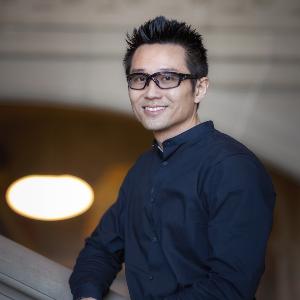In search of life in the universe
17 May 2023
How do we detect life on exoplanets via astronomy? This is the question being asked by theoretical astrophysicist Kevin Heng, who was appointed full professor in the Faculty of Physics in August 2022.
17 May 2023
How do we detect life on exoplanets via astronomy? This is the question being asked by theoretical astrophysicist Kevin Heng, who was appointed full professor in the Faculty of Physics in August 2022.

Professor of Theoretical Astrophysics Kevin Heng | © Alessandro Della Bella
Professor Kevin Heng’s research is based on taking measurements from planets outside our solar system, known as exoplanets. Measurements like the ones recorded at LMU’s Wendelstein observatory. “Every molecule, like water or methane, has a certain pattern of spectral lines. You can measure that and analyze it,” says Heng. Spectral lines are made by light of a certain frequency that’s been excited by an atom or a molecule.
But even if they do manage to detect the presence of these molecules on planets, it does not by any means follow that the scientists would be able to conclude whether the conditions for life might exist and what constellation of molecules made it possible. “There is no ‘magic molecule,’” Heng tells us, “because it depends on the planet’s whole atmosphere.” And that, he says, cannot be explained by looking mainly at the biology. Heng firmly believes that it’s the geochemistry on exoplanets that matters, because that affects the constitution of the atmosphere. For instance volcanic eruptions, because they too can release carbon dioxide or methane.
When he first came to LMU he therefore made contact with the geoscientists, first and foremost volcanologist Professor Donald Bruce Dingwell — a renowned expert in his field. The two scientists have meanwhile agreed to collaborate on studying the atmospheres of extrasolar planets.
For Heng, the exciting thing about his new place of work is the expertise clustered in Munich, not only in his discipline or the adjacent sciences but also beyond that. “Successful research only works when there’s a network of astrophysicists working on the theory, astronomers doing the observations, and engineers building the research tools and measuring instruments, alongside the other sciences too,” says Heng. “And Munich has all of that.”
Before he moved to the University of Bern and eventually to LMU, the Singapore-born scientist studied astrophysics in Colorado and then went to the legendary Institute for Advanced Study at Princeton University — known as the workplace of scientists like Albert Einstein and Julius Robert Oppenheimer. At Bern, Heng was formally head of the Center for Space & Habitability — a research institution with the objective of fostering interdisciplinarity and giving young scientists from different disciplines the opportunity to develop their own ideas — without pressure and, most importantly, without big hierarchies. “I think researchers need the freedom to try things out.”
Successful research only works when there’s a network of astrophysicists working on the theory, astronomers doing the observations, and engineers building the research tools and measuring instruments, alongside the other sciences too. And Munich has all of that.Professor Kevin Heng
Heng is engaged in a wide range of scientific interests and activities — such as writing textbooks. “I love writing,” he says. And he is successful at it, having already won a writing award from American Astronomical Society for his textbooks. He believes it is important to present his specialist subject in a way that people can understand. As is the case in the latest publication he worked on with researchers from other disciplines: Philosophy of Astrophysics is due to be published shortly and elaborates on the philosophical issues around black holes, among other things. “We are kind of approaching astrophysics in two ways: on the basis of hard facts and through philosophy. Because even though we in physics agree that nothing exists until you measure it, there are still open questions. That’s where the philosophers come in.
”Above all, it is the excellent research opportunities that have led Kevin Heng to LMU. But he can also well imagine living in Bavaria, because it’s not just in his science that he thinks outside the box. He is very pleased that his two sons are just the right age to be starting kindergarten and elementary school. He even demonstrated a flexibility in keeping his career options open: Back when he was still in the United States he took a six-month cookery course, “Just in case it didn’t work out with astrophysics.”